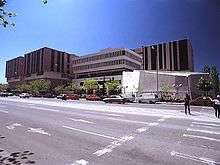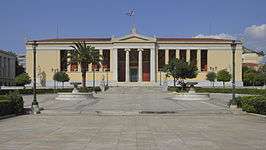University of Macedonia
{{Infobox university
|name = University of Macedonia
|native_name = Πανεπιστήμιο Μακεδονίας
|image_name = University of Macedonia logo.png
|motto = University of Economic and Social Studies
|established = 1957 in Thessaloniki
|staff =
|rector = Achilleas Zapranis
|vice_rector = Konstantinos Papadopoulos
[[Eftichios Sartzetakis] [Iordanis Eleftheriadis]]
|city = Thessaloniki
|country = Greece
|province = Central Macedonia
|campus = Urban (approx. 40.000 square meters)
|former_names = School of Higher Industrial Studies of Thessaloniki (in Greek: Ανώτατη Βιομηχανική Σχολή Θεσσαλονίκης)|
|faculty = 147
|students = approx. 15,339 registered
approx. 6,000 active
|type = Public
|nickname = UoM, Pa.Mak. (Πα.Μακ.)
|colours = Dark blue, Yellow, Orange
|website = http://www.uom.gr
|}}

The University of Macedonia (UoM; Greek: Πανεπιστήμιο Μακεδονίας (Πα.Μακ.), Panepistímio Makedonías (Pa.Mak.)) is located in Thessaloniki, Macedonia, Greece. It is the second largest university in the city (following the Aristotle University of Thessaloniki). It currently consists of eight departments which deal mainly with social, political and economic sciences.
Before 1991, it was known as "School of Higher Industrial Studies of Thessaloniki" ("Anotati Viomihaniki Sholi Thessalonikis"). After the change of its name (and location), more departments were added expanding its scope beyond management and economics. A Local Committee of AIESEC (the first one in Thessaloniki) is in operation (has its office in the ground floor of the main building) and is very active with promoting AIESEC's scopes. Also a local section of Erasmus Student Network, ESN UOM Thessaloniki (the first section in Thessaloniki) is active in promoting, developing and supporting the Erasmus community.[1]
Facilities
The University of Macedonia is located on 156 Egnatia Street. The campus is made up of a group of buildings with a total area of approximately 40.000 square meters, consisting of amphitheaters, teaching and seminar rooms, offices and the areas of the administration sections, a restaurant (which operates during the whole academic year), a gymnasium and a book-store; also a child-care station will soon be operating. There are also two guestrooms where 4-8 persons (mostly official visitors) can be accommodated.
The University has recently added a main auditorium that will also host cultural events of the city.
Academic evaluation
An external evaluation of all academic departments in Greek universities will be conducted by the Hellenic Quality Assurance and Accreditation Agency (HQAA) in the following years.[2]
- Department of Economics (2014) [3]
- Department of Business Administration (2010) [4]
- Department of Accounting and Finance (2014) [5]
- Department of International and European Studies (2014) [6]
- Department of Balkan Slavic and Oriental Studies (2014) [7]
- Department of Music Science and Art (2014) [8]
- Department of Educational and Social Policy (2013) [9]
- Department of Applied Informatics (2013) [10]
Departments
Department of International and European Studies
The Department of International and European Studies was established in 1990 as The Department of International and European Economic Studies. In 1993, according to presidential decree, it changed its name and academic content, which has been retained ever since.
The subject areas of the department include: International and European Finance, Political Science, International Relations, Foreign Politics and Diplomacy, Political Theory, Comparative Political Institutions, International Law, Institutions of the European Communities, the European Union and International Organizations.
Department of Applied Informatics
According to the Establishing act of the Department of Applied Informatics, its mission is to promote and further develop the science of informatics, with special emphasis on the development of systems for managerial and economic applications and the training of high level executives for the country's needs.
In addition to the theoretical education offered to the students, particular attention is paid to their practical training on developing software for economic and managerial applications.
The programme of studies includes courses from the disciplines of Computer Science, Economics and Business Administration. The department's graduates are well qualified to meet the demanding requirements of the modern business world.
Department of Educational and Social Policy
The Department was established by Presidential Decrees 267/93 and 391/95 (published in the Governmental Gazette No. 217/25-10-95). The first students were admitted in the Department in September 1997.
The Department of Educational and Social Policy was established in an effort to serve certain areas of science that have become of special interest to the international community.
Department of Balkan Slavic and Oriental Studies
The Department of Balkan, Slavic and Oriental Studies is an interdisciplinary department. It was established according to the Presidential Decree 363/20-9-96 and the first students were admitted in September 1998. The admission terms and the number of students admitted per year is specified according to the decrees in force regarding the admission of students in a graduate level institution.
Department of Music Science and Art
The Department of Music Science and Art was founded in 1996. The Department offers four set majors in:
- European (Classical) Music
- Byzantine Music
- Greek Traditional (Demotic) Music
- Contemporary Music
Library
University of Macedonia has created two new departments, the Technology Management Department in Naousa, and the Marketing and Operations Management in Edessa, where the respective departmental Libraries also operate.
University of Macedonia also supports the development and enrichment of the Library of the Experimental School.
Memberships and cooperations
University of Macedonia is currently member of the following associations/organizations:
- Member of European University Association (EUA)
- Hellenic Academic Libraries Link (HEAL-Link)
- EMAS - Green University
- OLYMPIA - Summer seminars
See also
- List of universities in Greece
- List of research institutes in Greece
- Aristotle University of Thessaloniki, the largest university in the Balkans, established in 1925.
- Alexander Technological Educational Institute of Thessaloniki, a technological oriented institute, established in 1970.
- Education in Greece
- Academic grading in Greece
- Balkan Universities Network
References
- ↑ ESN UOM Thessaloniki Section in University Of Macedonia
- ↑ Hellenic Quality Assurance and Accreditation Agency
- ↑ HQAA Final Report - Department of Economics, University of Macedonia, 2014
- ↑ HQAA Final Report - Department of Business Administration, University of Macedonia, 2010
- ↑ HQAA Final Report - Department of Accounting and Finance, University of Macedonia, 2014
- ↑ HQAA Final Report - Department of International and European Studies, University of Macedonia, 2014
- ↑ HQAA Final Report - Department of Balkan Slavic and Oriental Studies, University of Macedonia, 2014
- ↑ HQAA Final Report - Department of Music Science and Art, University of Macedonia, 2014
- ↑ HQAA Final Report - Department of Educational and Social Policy, University of Macedonia, 2013
- ↑ HQAA Final Report - Department of Applied Informatics, University of Macedonia, 2013
External links
- University of Macedonia - Official Website
- The Library - University of Macedonia (in Greek) (in English)
- University of Macedonia DASTA Office (Career Office & Innovation Unit) (in Greek) (in English)
- L.L.P. ERASMUS International and Public Relations Department - University of Macedonia (in Greek) (in English)
- ESN UOM Thessaloniki|Erasmus Students Network of the University of Macedonia
- AIESEC in University of Macedonia
- Hellenic Quality Assurance and Accreditation Agency (HQAA) (in Greek) (in English)
- Department of Business Administration, HQAA Final Report, 2010 (in English)
- Department of Educational and Social Policy, HQAA Final Report, 2013 (in English)
- Department of Applied Informatics, HQAA Final Report, 2013 (in English)
- Department of Economics, HQAA Final Report, 2014 (in English)
- Department of Accounting and Finance, HQAA Final Report, 2014 (in English)
- Department of International and European Studies, HQAA Final Report, 2014 (in English)
- Department of Balkan Slavic and Oriental Studies, HQAA Final Report, 2014 (in English)
- Department of Music Science & Art, HQAA Final Report, 2014 (in English)
- "ATHENA" Plan for Higher Education (in Greek)
- Greek Research & Technology Network (GRNET) (in Greek) (in English)
- okeanos (GRNET's cloud service) (in Greek) (in English)
- synnefo - Open Source Cloud Software (GRNET) (in Greek) (in English)
- Hellenic Academic Libraries Link (HEAL-Link)) (in Greek) (in English)
- Kallipos (e-books Greek academic publishing) (in Greek) (in English)
- Department of Applied Informatics - Information Security Group
Coordinates: 40°37′31″N 22°57′36″E / 40.6253°N 22.9600°E

